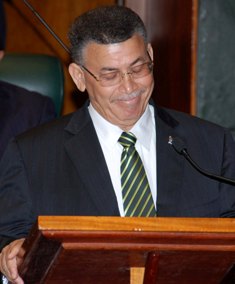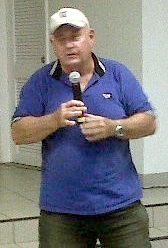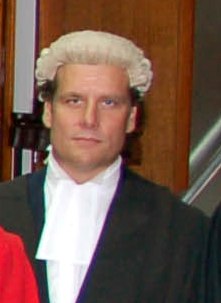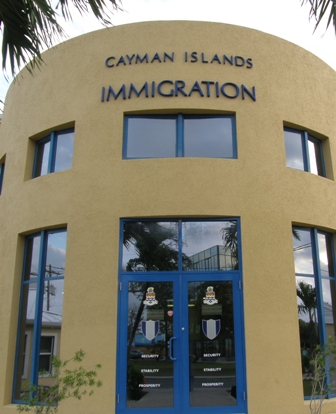Archive for January, 2010

Laundry robbed by armed cyclist
 (CNS): A man escaped with an undisclosed sum of cash on a bicycle last night after robbing the Quick Wash laundry, Dolphin Centre, Eastern Avenue, with what appeared to be a gun. George Town detectives are appealing for witnesses to the incident which occurred at about 7:11pm Friday evening, 15 January. The man entered the laundry with his head covered by a jacket, threatened staff and demanded money before making off from the premises with the money. When he left the laundry he was seen to get on a red bicycle, but police said they did not know his direction of travel is unknown.
(CNS): A man escaped with an undisclosed sum of cash on a bicycle last night after robbing the Quick Wash laundry, Dolphin Centre, Eastern Avenue, with what appeared to be a gun. George Town detectives are appealing for witnesses to the incident which occurred at about 7:11pm Friday evening, 15 January. The man entered the laundry with his head covered by a jacket, threatened staff and demanded money before making off from the premises with the money. When he left the laundry he was seen to get on a red bicycle, but police said they did not know his direction of travel is unknown.
No shots were fired and no-one was injured as a result of the incident. The suspect is described as being of chubby build with a dark complexion. He was wearing a black and white shirt, blue jean pants and had a black jacket in his possession.
Anyone who was in the area at the relevant time who may have information about the robbery, or who saw the suspect making off from the scene on the red bicycle, is asked to contact George Town CID on 949 – 4222 or Crime Stoppers 800 – 8477 (TIPS).
Crash claims one man’s life
(CNS): Update Saturday 12:50pm – Police have now officially named the man who was killed in a car smash last night (Friday 15 January) around 10.20pm. He was 23-year-old Matthew Antonio Bodden from Bodden Town, and the RCIPS is appealing for witnesses. Two men are in hospital and another two have been arrested for dangerous driving and DUI. The crash took place on Shamrock Road close to Wil T Drive involving a Honda Torneo and a Toyota Altezza travelling east on Shamrock Road. Police say that the driver of the Honda attempted to negotiate a right hand bend, he apparently lost control of the vehicle and collided with a concrete fence.(Picture courtesy of News 27)
The vehicle spun and debris flew across the roadway striking two oncoming vehicles. The four male occupants of the Honda where thrown from the car. The Toyota which had been travelling close behind collided with the Honda.
The two remaining passengers, aged 21 and 23, are being treated for minor head injuries and leg injuries respectively.
No injuries were sustained by anyone travelling in the Toyota, however the 23-year-old male driver has been arrested on suspicion of DUI and dangerous driving. No-one travelling in the vehicles struck by debris were injured.

Mac pulls no punches
 (CNS): Welcoming the new governor to the Cayman Islands, the premier wasted no time in telling him that he was now on “my home ground” after their recent meeting in London. Pulling few punches in his first public address to the new representative from the UK, McKeeva Bush said that Duncan Taylor would soon find that he believed in straight talk without falling out. He told the governor that he had arrived in challenging times when the credibility of his office was in question and he would face a tough test as it was a testing time for all. But the premier said the new governor would find Cayman had robust institutions as well as skilled, welcoming, people.
(CNS): Welcoming the new governor to the Cayman Islands, the premier wasted no time in telling him that he was now on “my home ground” after their recent meeting in London. Pulling few punches in his first public address to the new representative from the UK, McKeeva Bush said that Duncan Taylor would soon find that he believed in straight talk without falling out. He told the governor that he had arrived in challenging times when the credibility of his office was in question and he would face a tough test as it was a testing time for all. But the premier said the new governor would find Cayman had robust institutions as well as skilled, welcoming, people.
Before he delivered his full address, Bush drew attention to the grief in the community over the loss of five people at sea, which he said was the largest maritime loss of life in Cayman since the 1940s.
Welcoming Taylor on behalf of the Cayman people, he said the new governor would find them hospitable and prepared to offer the benefit of the doubt. However, Bush outlined the many challenges facing the islands and the need for the Governor’s Office to cooperate and build the relationship back between the UK and Cayman. The premier told Taylor that the good news was he could look forward to working with a government that was supported by a motivated and skilled population. He said the last time he was in London things had improved as the UK had realized it “should not ride us like a donkey”.
Bush took the time to address a number of current key political areas, including the legal aid dispute, and he said the country’s lawyers had to start contributing towards the cost or legal representation. He spoke about the possibility of government funding public students to go to private school instead of building another school in West Bay, and the pressing issue of crime, which he said was of major concern. “We can no longer claim to be a crime free society,” he said, despite the fact that the majority was peace loving and respected the rule of law. The premier promised that his government would vote money to fight crime but the administrating power had to recognize the need to send a strong message to the criminal element.
He warned the governor that the Cayman Islands was small, where rumours could be powerful and he should expect people to come running to his office and twist things.
At the close of what was a lengthy address he told Taylor; “Me and you need to talk.”
In response Taylor said he was well aware he had agreat deal to learn and he approached the task with enthusiasm and recognized his role was to serve not to rule. Listening, he said, would be one of his first tasks, so he intended to make visiting all the districts a priority. He explained his vision was one of partnership and cooperation with the elected government and his key objectives were to promote a positive relationship between the UK and the Cayman Islands, to ensure effective operation of the new Constitution and effective delivery of the services under his area of responsibility, particularly security, and to promote good governance. “This phrase does not always get good press, but it should,” he said.
Check back to CNS over the weekend for more details of the governor’s arrival, his comments and those of the premier during the swearing in ceremony.

Learn how to defend yourself
 (CNS): With the goal of increasing people’s awareness of potential threats and how to avoid potential conflicts, Bob Daigle and the FAST Defence team will host a Personal Safety seminar at the Cayman Prep School on Smith Road on Saturday, 6 February. According to Daigle, over 600 people have taken part in the three-hour course over the past nine months, and with the number of home invasions, muggings and other violent crime on the rise, more and more people want to know how to protect themselves and their families.
(CNS): With the goal of increasing people’s awareness of potential threats and how to avoid potential conflicts, Bob Daigle and the FAST Defence team will host a Personal Safety seminar at the Cayman Prep School on Smith Road on Saturday, 6 February. According to Daigle, over 600 people have taken part in the three-hour course over the past nine months, and with the number of home invasions, muggings and other violent crime on the rise, more and more people want to know how to protect themselves and their families.
“Utilizing the unique training methodology from FAST Defence and the use of state of the art training equipment, ‘Bulletmen suits’, we are able to create the most realistic training conditions anywhere in the world. Our highly trained team will create realistic scenarios for our students making the student forget they are in a classroom and think they are really in a threatening situation,” Daigle said.
The seminar is for males and females ages 12 and up. “We find that when young people take this course they are less likely to start a fight and will use the conflict resolution skills taught to avoid violence. Many of our youth are bombarded by violence in video games, movies, TV, etc. They have become desensitized to violence. We teach the students how not to loose their cool in a heated situation,” Daigle said.
The FBI says over 70% of assaults can be stopped in their tracks with the proper verbal response, he noted, and said the more confident a person is the less likely they will start a fight. “We all know bullies lack confidence and therefore pick on easy prey in order to feel better about themselves.”
James Burch, a past participant, said both he and his wife found the course beneficial. “I am normally pretty sceptical about these kinds of things but it opened my eyes to the techniques and skills everyone should learn to protect both themselves and those they care for. The development of the class, from avoiding conflict to channelling the adrenaline rush and, finally, as a last resort, the striking, was brilliantly put together and we cannot speak highly enough about both the class and the instructors. People need to do this course to practice and find solutions to circumstances for which there are usually no dry-runs."
For more information contact Bob Daigle at fastdefence@yahoo.com or call 925-6946
Space is limited.

South Sounders say “Noâ€
 (CNS): Almost one hundred people came out to a meeting on Thursday evening to raise their objections to the plans to develop a residential condo complex with a channel linked to the ocean through South Sound Road. Although there were no representatives from the development, residents and others from across Grand Cayman voiced their objections and signed the petition put together by those organising the opposition to Emerald Sound, a development by RC Estates. Local activist and former politician Berna Cummins, one of the lead organisers, said they would be submitting an official objection to planning from those in the area but also sending the petition to everyone concerned. (Left: Peter Millburn one of many who raised the dangers of the canal at the meeting)
(CNS): Almost one hundred people came out to a meeting on Thursday evening to raise their objections to the plans to develop a residential condo complex with a channel linked to the ocean through South Sound Road. Although there were no representatives from the development, residents and others from across Grand Cayman voiced their objections and signed the petition put together by those organising the opposition to Emerald Sound, a development by RC Estates. Local activist and former politician Berna Cummins, one of the lead organisers, said they would be submitting an official objection to planning from those in the area but also sending the petition to everyone concerned. (Left: Peter Millburn one of many who raised the dangers of the canal at the meeting)
She said even though planning was only required to consider the objections of those in the 1500ft radius, she would be sending the objections from the wider community to the Central Planning Authority as well as elected ministers, the Department of the Environment and the NRA among others. “We will take this all the way to the privy council if we have to,” Cummins told CNS.
Cummins noted that the proposal to cut a canal through the road affected many people and not just immediate residents. Such a fundamental change could not be confined to the objections of just those immediately impacted but by a wider audience she noted. Cummins suggested the objections to Emerald Sound were not objections to the development per se but the proposals regarding the canal, the dredging and the development on the shoreline.
During the meeting many people said they too would not object to a development on the land side but some of Cayman’s oldest mariners and seaman offered the benefit of their experienced and warned that cutting a canal was an extremely dangerous and foolhardy venture.
Others offered more personal objections and Billy Adam pointed to the environmental dangers and the pressing need for the National Conservation Bill, which governments had promised and failed to deliver for years. He said the problem lay with the laws and people's failure to obey them, which led to corruption and the need for gatherings such as the one they were at. He also observed that the law which limited objections to the 1500ft radius was flawed and had taken away people's rights.
“If you have no laws you have nothing to protect you and things become corrupt,” he said calling for implementation of the National Conservation Bill and for the people to organise a proper public demonstration.
Community Minster Mike Adam, who also attended the meeting with George Town MLA Elio Solomon, said he had listened carefully to the concerns and he too had his heart in South Sound as it was where he had grown up. He admitted that there were problems with the laws and they were under review. He said that what the people were doing was democracy at work and urged them not to give up. He also said he would follow the process but stopped short of saying that government would oppose the development.
Elio Soloman added that “perhaps” Mark Scotland “might” bring the National Conservation Bill sometime this quarter.
Speaking with CNS after the meeting, Director of Planning Haroon Pandohie explained he had attended the meeting to offer information on the process but he did offer any opinion on what had been said.
He did, however, say that the CPA was obliged to consider objections from those living within the 1500ft area as well as submission from other government departments, including the Department of the Environment, as well as the NRA and others. He did not say if the planning meeting when it was held would be open to the public and he said it would be up to the chair of the board if the media would be allowed to cover the meeting.
Burns Conolly, who is representing the developers, had re-notified those living within a 1500ft radius of the development on 23 December and the revival of the projected was reported on Sunday on CNS, which was followed by a surge of opposition on the comment board and on the radio talk shows.
Anyone wanting more information about the details of the development can contact Burns Connolly bconolly@burnsconolly.com. Plans can be viewed at the Planning Department and details about the objections can be gained from berna@candw.ky as well as hard copies of the petition. Anyone wishing to sign the petition can also do so on line at http://www.PetitionOnline.com/ci345es/petition.html

Police investigate gun shot reports in West Bay
 (CNS): Although no one was injured police are reporting damage to a house and a car yesterday (Thursday 14 January 2010) from a number of incidents where guns appeared to have been fired in three different areas of West Bay. Officersfrom that district are now investigating the incidents the first of which occurred about 1.55 p.m. in Vibe Lane, the second at about 9.20 pm at a house in Fountain Road, and then another a short time later again in the Vibe Lane area. Police were first informed by a member of the public in the afternoon that they heard gun shots.
(CNS): Although no one was injured police are reporting damage to a house and a car yesterday (Thursday 14 January 2010) from a number of incidents where guns appeared to have been fired in three different areas of West Bay. Officersfrom that district are now investigating the incidents the first of which occurred about 1.55 p.m. in Vibe Lane, the second at about 9.20 pm at a house in Fountain Road, and then another a short time later again in the Vibe Lane area. Police were first informed by a member of the public in the afternoon that they heard gun shots.
Attending the first scene in the afternoon at Vibe Lane police said no-one was injured and there was no damage to property. Following the second call regarding shots fired at a house in Fountain Road, witnesses told police a car had sped away from the scene and while no-one was injured the house and a SUV parked at the location were damaged.
A short time later, shots were reportedly heard again in the Vibe Lane area where police were also informed that two cars had been seen in Mount Pleasant Road and the occupants of one vehicle were apparently shooting at the other car.
These cars are both described as white in colour. The car carrying the people who were allegedly shooting at the other had red stripes on the side. West Bay CID officers are investigating these incidents and door to door enquiries are ongoing in the area. One line of enquiry being pursued by police is that the incidents may be linked.
Detective Sergeant Oremule of West Bay CID is appealing for anyone with information about the incidents, or who saw a car speeding off from Fountain Road to come forward. He would also be keen to speak to anyone who saw the two white cars in the Mount Pleasant Road area last night.
Anyone with information should contact West Bay police station on 949-3999 or Crime Stoppers on 800-8477(TIPS).

Another company pulls out of the Cayman Islands
 (CNS): Following news earlier this week that insurance and re-insurance firm XL Capital Ltd is to change the parent holding company’s place of incorporation from the Cayman Islands to Ireland, LOM (Holdings) Limited announced yesterday that its Cayman office will close as of the 31 March 2010, and that the firm will make its office in the Bahamas its “new regional hub”, saying the move was part of a wider review of its strategy regarding overseas offices and “ultimately reflects the realignment of the offshore investment environment over the past few years.”
(CNS): Following news earlier this week that insurance and re-insurance firm XL Capital Ltd is to change the parent holding company’s place of incorporation from the Cayman Islands to Ireland, LOM (Holdings) Limited announced yesterday that its Cayman office will close as of the 31 March 2010, and that the firm will make its office in the Bahamas its “new regional hub”, saying the move was part of a wider review of its strategy regarding overseas offices and “ultimately reflects the realignment of the offshore investment environment over the past few years.”
In a press release Thursday, LOM said that after an exhaustive review of its regional operations, it had decided that it was in the best interest of its clients and shareholders to support the entire Caribbean region from one office. Therefore, the firm had determined that Nassau, Bahamas would be its new regional hub. LOM has had an office in the Bahamas since 2001, and Nassau General Manager Craig Lines said, “Uniting our entire Caribbean sales team in one place will allow us to more efficiently manage clients throughout the Caribbean, Central America and South America.”
Existing customers of LOM Securities (Cayman) Limited will be given the choice of moving their accounts to either Bermuda or the Bahamas and LOM said it would do its utmost to make the transfer as seamless as possible.
LOM captive insurance and trust programs will be serviced from the firm’s headquarters in Bermuda. Portfolio Managers and Advisors will be making regular visits to the island to meet with the captive managers, lawyers and auditors that service our clients, the release said. In addition, LOM Asset Management will continue to support the Insurance Managers Association of Cayman (IMAC) and will be exhibiting for the eighth year in a row at the 2010 Cayman Captive Forum.
Beginning 1 April 2010, all communication will be redirected to Nassau and any remaining Cayman customers will be serviced out of the Bahamas office until they can be transferred as per client requests and LOM said that all of the staff and financial advisors in the Cayman office have been offered the opportunity to relocate to our Bahamas or Bermuda offices.
“While LOM regrets this move after 15 years of being in Grand Cayman, it is part of a wider review of our strategy regarding overseas offices, offshore costs and ultimately reflects the realignment of the offshore investment environment over the past few years,” the release said.
Related article: Ireland beats Cayman for XL
Lawyers focus on motive
(CNS): As both lawyers closed their cases on Thursday in the trial of Randy Martin for the murder of Sabrina Schirn in East End last March, motive became the focus of the legal teams. Solicitor General Cheryll Richards said that the prosecution was not required to provide a motive to prove its case, butsaid they had put forward a powerful reason for Martin to kill Schirn. However, the defence argued that the motive was demonstrable weak and, in fact, the crown had provided no motive at all. Despite there being no requirement, the defence said there were few murder cases with an absence of motive, as in this instance.
When Richards closed the crown’s case, she pointed to the circumstantial evidence, which, when placed together, indicated the guilt of the defendant. She said that motive was not required but pointed to the belief that Martin had harboured that Schirn was connected to his brother’s shooting, which, she said, was a powerful reason. She said there was evidence of premeditation and planning of the crime, the opportunity to commit it, conduct that pointed to guilt, and DNA evidence against Martin.
She dismissed the fact that Martin had only one good arm, and noted that witnesses had said Martin was able to manipulate his weaker arm and in court he had refused the assistance of the usher when handling exhibits. She said that, despite the conflicting witness statements of prison officers, Officer Dehanny had a more accurate recollection and he had said Martin was missing for about 45 minutes at lunch time, when it is believed Schirn was killed.
Richards pointed to telephone evidence that conflicted with Martin’s statements, which he could not explain away, and she described him as someone who spoke and told lies when there was no need to. “His explanation is contrived and implausible,” Richards stated. The solicitor general said he had access to a weapon and his conduct and behaviour following the murder pointed to guilt. She said witnesses referred to Martin appearing in different clothes and there was the DNA evidence. She said his explanation for Sabrina’s blood on his belt and glove was incredulous and that no woman would use a dirty soiled glove to wipe herself in such an intimate way when in her car there were so may other things to use.
She also noted that Schirn’s and his DNA were inside the glove — something that again he could not explain. She dismissed the evidence of the witnesses called by the court and stated that there was no evidence that Lance Myles was involved and that even the defendant had suggested Myles did not know where the meeting places were on the prison farm.
Closing the defence’s case, lead counsel David Evans QC focused very much on the motive and said that the complete absence of a motive was significant. He said the crown’s case that Martin believed Schirn was responsible for his brother’s shooting was simply not true. It was well documented, Evans said, that by March 2009 Martin knew full well the identity of the girl that had made the phone call to bring the gunman to his brother’s door. Evans said there was just no motive, even though the crown had searched hard for one.
“In his own words, why would I wish to kill Sabrina?” Evans stated, adding that this was the key question. While Martin had no motive, others certainly did, Evans claimed, and noted the threatening messages left my Myles. He said that the evidence gatherers had failed to conduct a thorough enough investigation and left the Myles question hanging, which had to raise doubts about the strength of the crown’s case, and the court was required to consider that other evidence.
He said Martin’s conduct was equally likely to point to innocence as it was guilt and that there were significant gaps in the crown’s case which had led them to speculate about what may have happened and arrived at curious scenarios. If anything, he said, the crown’s case was “wholly implausible and incredible”.
Referring to the idea that Martin had planned the murder, he said that would have been a very high risk scenario and very difficult to put together. He asked how he had gotten the machete passed Sabrina in the first place, how he had driven the car away in bloody clothes without leaving anything more than a mere trace on the ignition, or how he had reportedly changed his bloody clothes without being noticed — clothes which, despite extensive searches, were never found.
“Many features go against pre-meditation if the defendant had committed this crime,” Evans said. He noted that if Martin was the assailant there were many guesses and gaps in the evidence that were difficult to explain away if the defendant was guilty but would be easier to explain if it was another perpetrator who was not at the time incarcerated.
The defence noted that the crown did not put forward the case that Martin could have been at the scene with someone else, whom for whatever reason he had decided not to declare, but the defence said if the court chose to consider that option it was unlikely that Martin was himself the killer, even if he was there. Evans said the crown had not proved Martin was at the scene or that he was the killer.
Pointing to the lack of blood when Martin returned to the farm and his attempts to secure the ganja, Evans said this was not the behaviour of a man who was aware that a young woman’s body lay less than a mile away, killed at his hand. The QC noted the small amount of blood found on the glove and so little found in the car, which he said all pointed to Martin’s explanation of having sex with Sabrina when she was menstruating and using the glove to clean up. He said if the glove been used to weald a machete that chopped at Sabrina so many times in such a brutal attack, there would have been much more blood on it.
Evans said the crown had failed to prove its case and there was no surety, no certainty, and if the burden of proof was applied properly by the court, this case was not proven.
Martin elected for a judge alone trial before Justice Charles Quin, who is now considering the evidence. Unlike in a jury trial, when a judge decides a case he must also give a full explanation for his verdict, so when he notifies the court that he is ready to give that verdict he will also reveal the reason for his decision. CNS will be there to report on that at the earliest possibility.

Lawyer’s clubs voice concerns as new legal year starts
 (CNS): The Chief Justice was not only the only one to raise his concerns about plans by government to change the legal aid system during the opening session of the Grand Court this week. Both the Cayman Bar Association and the Law Society said they were concerned about the decision and the failure to consult the profession. The two bodies also raised concerns about delays in important legislation, the need for a new court house, as well as the lingering issue over the judiciary from Operation Tempura, the UK special police investigation.
(CNS): The Chief Justice was not only the only one to raise his concerns about plans by government to change the legal aid system during the opening session of the Grand Court this week. Both the Cayman Bar Association and the Law Society said they were concerned about the decision and the failure to consult the profession. The two bodies also raised concerns about delays in important legislation, the need for a new court house, as well as the lingering issue over the judiciary from Operation Tempura, the UK special police investigation.
James Bergstrom President of the CBA said the exclusion of the local bar over the legal aid issue was a matter of grave concern and said it had endorsed the recommendations of the Law Reform Commission as noted in their Final Report from July 2008 at the opening of the Grand Court in January 2009.
“We are not sure what is being proposed, other than what we have read in our local newspapers,” Bergstrom said.”What is clear is that the recommendations in the LRC report have not been followed. Despite letters of protest, the CILS and the CBA have not been invited to participate in a hastily formed committee set up to consider the new proposals.”
He said that while the CBS had been given the opportunity, along with the public, to provide comments in the absence of any proposals to review, the position could only be to support the recommendations of the LRC whose members he said had done considerable research before producing their original report.
“Ensuring that all defendants receive a fair trial is part of the basic fabric of any modern society. We must ensure that whatever we end up with in Cayman meets international standards and does not result in convictions being subject to challenge and the very serious consequences that could have,” Bergstrom added.
Alasdair Robinson from the Law Society who presented a speech on behalf of Charles Jennings the president said the society endorsed all of Bergstrom’s comments on the subject but Jennings also added further concerns and stated that the profession was extremely surprised and disappointed not to have been directly represented on the new committee.
“The Law Reform Commission recommended the preservation of the present system, albeit with suggestions for its modification and enhancement. Both the Cayman Islands Law Society and Caymanian Bar Association endorsed those recommendations,” Jennings stated adding that fair access to legal representation was fundamental to the principles of justice.
“We would respectively ask the committee to consider carefully and thoughtfully all options open to them and we stand ready to provide comments and input on any alternative proposals put before them. We would also respectively request that the profession be provided with a draft version of the Committee’s report to the
During his presentation for the CBA Bergstrom also noted the increase in crime and its impact on the justice system. “It is vital that the concerned authorities, including the Commissioner of Police, the new Director of Public Prosecutions and the Director of Prisons, as well as senior members of the criminal bar, meet regularly and coordinate the necessary modernisation and smooth operation of our system so that we are in the best position to tackle the changing face of crime in these Islands,” he said. “It is especially important that weaknesses in the investigation and prosecution of serious cases be recognised and addressed and that the Judicial Administration is provided with the resources it needs to ensure that cases are disposed of in a timely and just manner. This, of course, includes the new Court building which is very badly needed and which has been promised for so many years now.”
Bergstrom said there was a pressing need to pass the Legal Practitioners Bill the revised version of which had been approved by the profession and submitted to Cabinet. “Although we have not had a response from the Government, we are hopeful that we will see the revised Bill brought into force in the first quarter of 2010. Our reputation as an international financial centre remains at risk until this is done,” he added.
Jennings focused his concern on the need for legislation to help Cayman’s offshore sector compete in tough times. “It is not an exaggeration to say that the offshore financial industry is presently the mainstay of the Cayman Islands economy, and the legal profession, charged as it is with advising on the structuring of the vehicles required by the industry, is at the very forefront in our efforts to maintain the Cayman Islands as a pre-eminent, reputable offshore jurisdiction,” he said. “The laws of the financial industry, just like those governing domestic matters on the island are never set in stone. “
He explained the sector need laws quickly to find solutions to new problems.
“The sad fact is, that is simply not what is happening at the moment,” he said. “During the course of 2009, there were 3 important pieces of legislation introduced that had a material impact on the financial services industry: The amendments to the insolvency regime under the Companies Law; the introduction of "merger" provisions to our Companies Law and the amendments to the Exempted Limited Partnership Law. All of the legislative changes were initiated by the private sector, however what is concerning is the length of time it took for these initiatives to see the light of day. In the case of the insolvency changes, these were first proposed in September 2005, with respect to the merger provisions, December 2004 and in the case of the partnership law, February 2006.”
He compared Cayman to its competitors and said in the last 5 years Cayman introduced 14 pieces of new financial services legislation while Jersey introduced 27 and BVI, 18. “Atpresent we have 3 other key pieces of proposed financial services legislation, some prepared by government and some by the
Jennings said the Amendments to the Companies Law would give Cayman a modern law at the forefront of international financial centres, amendments to the Insurance Law were called for by the IMF and the repeal of the criminality provisions of the Confidentiality Relationships Preservation Law was needed as that had long outlived its usefulness. “A draft bill was produced but again this has not seen the light of day,” Jennings lamented. He also explained there were a number of other proposals that the private sector had made but with the existing backlog of critical financial services legislation, they had not made it as far as draft Bill stage. Without a "fast track" approach to get new ideas considered, drafted and adopted, he said there was little motivation for the sector to be innovative in this area and help improve Cayman’s fortunes.

Fees up for foreign workers
 (CNS): Employers will start to feel the pinch when it comes to work permit fees as early as Monday, 18 January, as government attempts to bring in some CI$22.5 million of additional revenue over the next twelve-months. The fees have been increased through an amendment in Cabinet and not through the Legislative Assembly, so there has been no public scrutiny of the changes. However, the new schedule has been placed on the immigration website for employers to check how much more their foreign labour is now going to set them back.
(CNS): Employers will start to feel the pinch when it comes to work permit fees as early as Monday, 18 January, as government attempts to bring in some CI$22.5 million of additional revenue over the next twelve-months. The fees have been increased through an amendment in Cabinet and not through the Legislative Assembly, so there has been no public scrutiny of the changes. However, the new schedule has been placed on the immigration website for employers to check how much more their foreign labour is now going to set them back.
The plan to increase work permits has drawn criticism from a number of quarters, but the government has insisted that, given the choice, it is better by far than direct taxation. In the latest sitting of the Legislative Assembly the government said that, when the country’s finances improved, the UDP administration would be willing to look at the possibility of reducing these fees as well as others that have formed part of the 2009/10 budget.
However, while businesses will be hit hard by these increased fees at a time when profits are harder to come by, fears are mounting that the downsizing and reduction in many workplaces means that immigration revenue will still be considerably less than hoped for.
The new schedule reveals that several categories of employment are facing significant increases, as much as 50%, and there are already complaints from the private sector that fees for some jobs are disproportionately high. For example, one industry source told CNS that the increase for a senior auditor to $12,500 was inordinately high in comparison to salaries.
“The large accounting and legal firms pay an additional charge per professional on top of this,” said Steve McIntosh from CML Offshore Recruitment. “It will be interesting to see to what extent this cost merely gets passed on to clients, as this would represent a double whammy to the fund administrators and captive managers, whose fees have also increased.”
He said the disparity between fees for accounting and legal is still an anomaly — a problem which arose when trying to tax job titles. "It makes no allowance for companies or industries that have already been hit hard by the recession, no allowance for small companies or new companies and no allowance for part-time staff.”
McIntosh suggested the fee increases could not have come at a worse time with an already -declining financial industry and unprecedented competitive pressure from other offshore jurisdictions. “These increases could well be counter-productive, resulting in a reduction in total work permit fee revenue, as we pass the tipping point on Cayman’s very own version of the infamous Laffer curve," he added. Business will simply cut staff, the recruiter said, so instead of collecting 50% more the government will collect 100% less on that permit fee.
An advocate of a direct payroll tax, McIntosh said the current system is inconsistent and in somecases "downright unfair". McIntosh admitted that there were no easy solutions regarding the budget deficit which the government has inherited but he added that it had also inherited an overly-complex fee schedule which was already full of anomalies.
During the original budget debate when plans for the increases to work-permit fees were first announced by Premier McKeeva Bush, he stated that the law requiring employers to pay employee pension contributions would be amended to allow for voluntary rather than mandatory contributions by employers and employees. So far, however, government has not made an announcement regarding any changes to the Pension Law.
Copies of the new fee schedule, which is contained in the Immigration (Amendment) Regulations, 2010, can be viewed or downloaded from the Department of Immigration website.